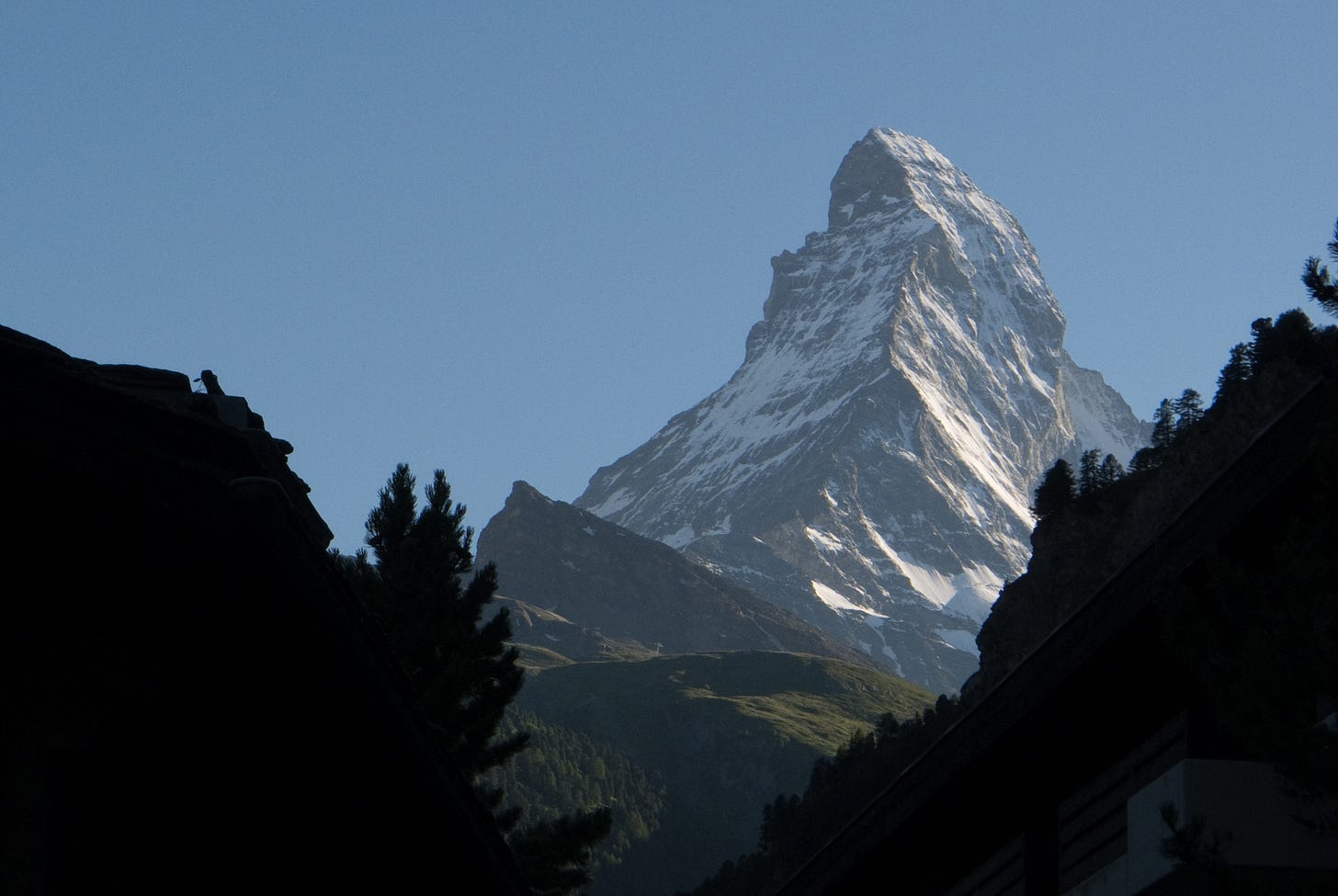Virginia Woolf meets the Matterhorn
Woolf's late short story 'The Symbol' is about a mountain. It really is! [1200 words 10min
I was going to write this week about Thomas Otley and his First Ascent of Sharp Edge on Blencathra. But while researching a future post on the Alpinist Lily Bristow, I came across this short story by Virginia Woolf. Which immediately joins my shortlist of altogether essential mountain reading.1
At 1200 words, ‘The Symbol’ is short but intense. If it were a climb, it’d be a classic single pitch route at American 5.6 or British trad grade Hard Severe. Given that Woolf died in 1941, more than 70 years ago, I was planning to paste her story right here into my Substack. But I ran into a strange quirk of copyright.
In the UK, a work unpublished in the author’s lifetlime is in copyright until
The first 1st January after the later of:
a) the author’s death plus 70 years
OR b) whichever’s earlier between:
the date of first publication plus 50 years
OR the year 2039
‘The Symbol’, written in 1941, wasn’t published until 1985. So it enters the public domain (here in the UK) on 1st January 2036. At which point, if I’m still alive myself, I’ll transcribe it into this Substack.
To keep you going in the meantime, here’s the opening paragraph and the third one. Together with the link to the full story at the London Review of Books, its original publisher.
The Symbol (Virginia Woolf 1941)
There was a little dent on the top of the mountain like a crater on the moon. It was filled with snow, iridescent like a pigeon’s breast, or dead white. There was a scurry of dry particles now and again, covering nothing. It was too high for breathing flesh or fur-covered life. All the same the snow was iridescent one moment; and blood red; and pure white, according to the day. …
‘The mountain,’ the lady wrote, sitting on the balcony of the hotel, ‘is a symbol ... ’ She paused. She could see the topmost height through her glasses. She focused the lens, as if to see what the symbol was. She was writing to her elder sister in Birmingham.
To on-sight the story, just click the link above (do return to this page to comment afterwards). If you’d prefer to top-rope it, next week’s posting will provide the same link, plus commentary and context.
Mr Jonathan Otley will just have to wait.
The others including Coleridge’s description of Moss Force waterfall, Shelley’s poem on Mont Blanc, Alfred Mummery’s ascent of the Col du Lion, certain extracts from WH Murray, WH Auden’s ‘Mountains’, and the Mont Blanc summit sunrise by Virginia Woolf’s father Leslie Stephen.







The telling quote: the young men are dead, the words are from the letter, ellipses are Lee’s:
<<To tell you the truth, I have practically no emotion left. I … have not even troubled to clean my nails. I have not done my hair. When I read a book I cannot finish it …. Vanity of vanities, all is vanity. When the doctor came I assumed a grave expression. Yet he guessed that I had only one wish — I cant [sic] even now write that down. …. Always to see that mountain. It drives me mad.>>
The last four words are crossed out—the app won’t let me show that.
I want to add, because I obscurely feel it is relevant, that Leslie Stephen, VW’s father, was a great alpinist, a conqueror of Swiss (and other) peaks. Plenty of symbolism at another level available there, and probably not worth pursuing. Thank you very much for the link, giving us her blessing should we prefer not to dwell on symbols. I had not heard of the story. The date is arresting: she died on 28 March. That thought sent me to Hermione Lee’s biography, which briefly mentions “The Symbol” (pp748-79, so I had heard of it, and forgotten) and has a telling quote from an early draft. Apparently she began writing it in late November 1940: coinciding more or less with the onset of her last depression—according to Lee’s account, not Leonard’s (which dated it from January ‘41).